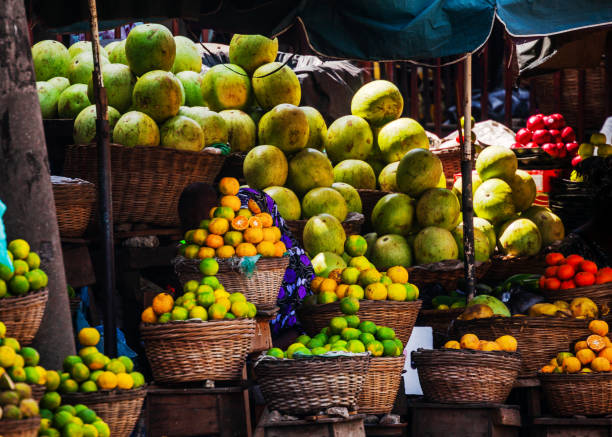Nigeria is home to a wide variety of fruits—from mangoes to pawpaws—but many are far more dangerous than they appear.
Behind their perfect appearance often lies a toxic secret—artificial ripening with calcium carbide and other harmful chemicals.
For years, this discreet practice has continued among fruit vendors desperate to satisfy market demands or reduce post-harvest losses. However, experts advise that this rapid-wealth pursuit is gradually poisoning consumers.
A toxicology report established that industrial-strength calcium carbide used in artificial fruit ripening is always impure with contaminants such as arsenic and other poisonous and carcinogenic chemicals.
They are highly toxic and may cause all kinds of health ailments, from mouth ulcers and irritation of the intestine to cancer, kidney failure and neurological damage.
The National Agency for Food and Drug Administration and Control, or NAFDAC, has continually cautioned that forced-ripened fruits could also cause headaches, dizziness, and prolonged exposure-related complications.
But the practice persists in Nigeria’s informal markets, where there is narrow regulatory oversight and retailers typically claim ignorance of safer options.
FG’s safety drive against toxic fruits
To address this, the Federal Competition and Consumer Protection Commission, or FCCPC, has rolled out a new national sensitisation and enforcement drive.
Working in collaboration with NAFDAC, the Standards Organisation of Nigeria (SON), and agricultural extension offices, the initiative seeks to end the use of toxic chemicals in fruit ripening and to promote safer, regulated practices.
Through an awareness programme, the push falls within an integrated food safety agenda set to encourage market quality, transparency of competition, and food safety.
There are penalties for offenders who persist with force-ripening, especially for large-scale wholesalers who supply goods across states.
Consumers are being urged to buy from trusted sources and to look out for warning signs of carbide use, such as unnatural bright colours, hard texture, and the absence of natural aroma in fruits.
States join the fight
In some regions of Nigeria, different state-level initiatives are complementing this national campaign.
The Nigerian Institute of Food Science and Technology, or NIFST, raised awareness among Ojuwoye Market vendors in Lagos about the risks associated with force-ripening fruits and the use of toxic chemical preservatives through a market campaign.
The initiative emphasised safer preservation methods, proper hygiene, and consumer education to reduce food-borne health risks.
Similarly, in Ekiti State, a sensitisation campaign organised by the FCCPC raised awareness among fruit vendors in Ado-Ekiti about the use of chemical ripening agents like calcium carbide and signalled stricter enforcement ahead.
These state programmes are increasingly building confidence among consumers and pushing traders towards safer, more transparent practices.
There are, however, drawbacks since Nigeria still lacks adequate testing labs and cold storage facilities, which makes natural ripening slow and costly.
Small-scale traders, particularly those outside the big towns, are prone to using carbide to make fruits riper quicker since it is affordable and easily accessible.
Without ongoing education and incentives—such as subsidies for safe ripening rooms or training through farmer cooperatives—long-term behaviour change may be difficult.
Nonetheless, the new drive represents a positive stride. It shows that food safety is no longer a side conversation but a national health priority.
Safeguarding consumers against forced-ripened fruits isn’t merely enforcement; it’s ensuring every Nigerian enjoys healthy, chemical-free food.
When markets become safer, public health improves, and confidence builds, proving that even small regulatory actions can lead to big national outcomes.
Summary not available at this time.






